Drew Myron's Blog, page 70
July 19, 2012
Thankful Thursday: Lush & Lively
It's Thankful Thursday.
Gratitude. Appreciation. Praise.
Please join me in a weekly pause
to appreciate people, places & things.
What are you thankful for today?
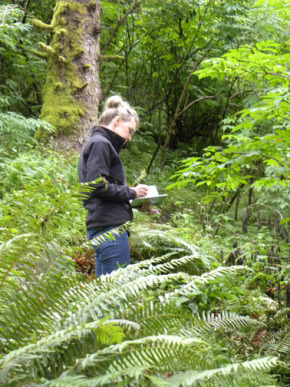 Sitka Center - photo by Khlo BratengWhen the mysterious mix of vulnerability and willingness blend, a writing workshop is transformed from routine to really fantastic.
Sitka Center - photo by Khlo BratengWhen the mysterious mix of vulnerability and willingness blend, a writing workshop is transformed from routine to really fantastic.
A powerful change occurs as people gather together to write. Time speeds, sometimes slow. The air carries a charge. Even the temperature of the room shifts, mirroring the slight but potent change within us, as if every cell is rearranging to make room for our real selves to emerge.
Twice this week I led workshops with writers — new and seasoned, young and old — who were eager and willing to go deep, and quickly.
At the Sitka Center for Art and Ecology, in Neskowin, Oregon, our small group spent the day wandering the unbelievably lush woods, exploring the physical and emotional meaning of place. We were reverent, reflective and relaxed.
A few days later, at a Willamette Writers workshop in Newport, Oregon, I spent the evening with a lively group of women (and one brave man), considering the power of scent. We wrote hard, pens pressed to page, then listened, and laughed, and laughed some more.
On this Thankful Thursday, I am humbled by, and thankful for, the mysterious shift — and for writers who are lush and lively, willing to open and express.
July 16, 2012
Rules for Writing (and for Life)
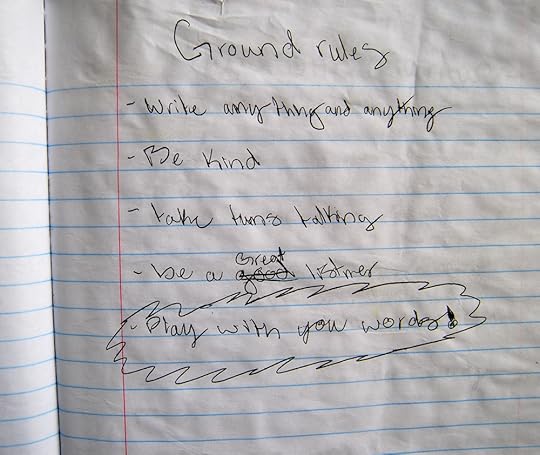
From the pages of youth, this Summer Camp student holds the keys to writing, and to life.
You never know how much is heard, or what will stick, but finding this journal page warmed my heart. A 12-year-old has captured all my favorite writing rules, with her own wonderful emphasis and embellishment:
Ground rules
- Write anything and anything.
- Be kind.
- Take turns talking.
- Be a good -- no great -- listener.
- Play with your words!
July 12, 2012
Thankful Thursday
July 10, 2012
5 Reasons To Attend a Writing Workshop
The workshop experience is often so much more than learning a particular skill . . . a workshop can change your perspective and transform what you believe is possible.
- Jalene Case
Sitka Center for Art and Ecology
 This week I'm gearing up for two workshops: a one-day workshop at Sitka Center for Art and Ecology, and an evening session with the Willamette Writers Coast Chapter.
This week I'm gearing up for two workshops: a one-day workshop at Sitka Center for Art and Ecology, and an evening session with the Willamette Writers Coast Chapter.
Here's a confession: I've attended, and led, dozens of workshops — and I still get nervous. As both participant and leader, the inner critic always shows up, saying: You're not good enough, You're not ready, and makes other paralyzing noises.
The good thing is that the minute I begin to write, all worry evaporates.
The other day a friend told me that she had started to write. She was excited but embarrassed. Maybe when I'm no longer a beginner, she said, I'll come to one of your workshops.
What!?!?, I said. Now is the perfect time.
Here's why:
5 Reasons to Attend a Writing Workshop
1.
We're all beginners
Even if you've written a dozen novels and hundreds of poems, you start over each time you write. A workshop is a great equalizer. You've written a bestseller? Great. You've never written? Great. Let's get together in a spirit of exploration — not to find rules or status, but to discover words, meaning, ourselves.
2.
Give yourself permission
Attending my first writing workshop was a big deal. I drove 5 hours, across two states, to spend a week with a group of people I did not know, for a workshop with a poet I had never even read (I was so new and clueless I didn't realize I should read the instructor's work before class). But none of that mattered; the important thing was that I was giving myself permission to be a poet. I hadn't told anyone I wrote poems, or that I harbored a desire to learn how to write better poems. I say this now with no trace of overstatement: That workshop changed the course of my writing life.
3.
Stretch yourself
If your last poem sounds like your first poem, if your writing group glazes over with the 100th reading of your tired story, it's time to shake things up. Familiarity breeds contempt. Sure, it's cozy here with your bag of tricks, but baggy sweats are also comfy and that's not a look improving anyone's life. A writing workshop is a great place to brush up, get dressed, and find a fresh focus.
4.
Encouragement
Last summer I led a one-day workshop attended by a mix of first-timers and published writers. A few days later I received what I consider a wonderful compliment and a great reason to attend a workshop:
My husband asked me what I learned. I answered that it wasn't that l learned some tricks to writing, or how best to use my time in order to write, or how to publish. What your workshop provided me was an opportunity to meet other writers and share experiences that helped me assess my own writing — the best kind of springboard to encourage me!
5.
There are no rules, but structure helps
Sitting at home, or at your writing desk, it's easy to find other things to do: fold laundry, wander Facebook, watch Mad Men, snack on a bag of chips. Sometimes everything is just too loosey-goosey. We need rules, structure, deadlines. A writing workshop recalibrates our system, giving us a much-needed nudge to keep ourselves on task and productive.
What's your experience?
Do you attend writing workshops? Why? Why not?
July 7, 2012
Love this passage!
Now I think the world is full of tiny, invisible strings we're scarcely aware of, of threaded gossamer so delicate it binds us to people and to places and the nethermost of gestures, to the tiny warblings of living beings, to the musty smell of other rooms. The strings tying us to each other are everywhere. We are connected to others in a spanning web: it is our job not to tear it, to keep it in good repair, even if we cannot see it.
- Robert Vivian, from The Diginity of Crumbs,
an essay in Cold Snap as Yearning
July 5, 2012
Thankful Thursday: Play (and Write)
On this Thankful Thursday, I am grateful for sunny skies and sunny children.
I'm still in the glow of last week's Summer Writing Adventure Camp. Now in its sixth year, the free camp is offered by Seashore Family Literacy and offers a week of high-energy explorations designed to fuel creative expression.
To inspire writing, our motley group of 12 youngsters (ages 10 to 14), and a sprinkling of intrepid adults, hiked Cape Perpetua, walked the historic Alsea Bay Bridge, traveled by city bus to explore Newport’s working bayfront, and kayaked Alsea Bay and Lint Slough. The video above captures the flavorful mix of exploration, introspection, and just plain fun.
Each year as the Summer Camp begins I feel a mix of worry that turns to wonder that turns to awe. At the end of the week, I always say, "best year ever!" And I (almost) always mean it.
It's Thankful Thursday.
Gratitude. Appreciation. Praise.
Please join me in a weekly pause
to appreciate people, places & things.
What are you thankful for today?
July 2, 2012
Winner!
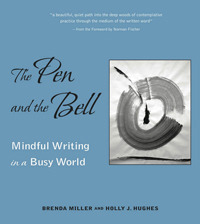
Congratulations to the winner in the book giveaway drawing:
Linda
Thanks to all who took a chance and played to win a copy of The Pen and the Bell: Mindful Writing in a Busy World, by Brenda Miller and Holly J. Hughes. Make an investment in your creative life and get your copy here.
Take a moment to read the Fast Five Interview.
June 27, 2012
Things Writers Do
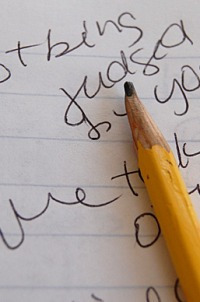 We're not writing.
We're not writing.
We're not writing enough.
We're writing but it's all junk.
The internal critic never stops!
No wonder we're miserable.
To counter this destructive loop, writer Molly Spencer has created Things Poets Do. It serves as a reminder of all she is accomplishing, rather than focusing on the things she has not yet achieved. It's a great mind shift, an excellent list, and I've adapted and expanded it for my own use:
Things Writers Do
1. Read and study a variety of good writing, especially contemporary work.
2. Keep up with the news of the literary world.
3. Draft poems, stories, essays.
4. Do research, legwork, word-work, and notebook-work to nourish the drafting process.
5. Revise work.
6. Connect with other readers, writers and artists.
7. Swap work for critiques.
8. Read Poets & Writers magazine.
9. Attend readings.
10. Give readings.
11. Spread the poems (stories, etc).
12. Read a variety of literary journals.
13. Research places to submit work.
14. Submit work.
15. Attend arts events to support local creativity, and for cross-pollination purposes.
16. Read essays to learn more about specific craft elements; generally, study elements of craft.
17. Attend classes, workshops, retreats, etc.
18. Get enough sleep, healthy food, exercise, and recreation (good self-care).
19. Apply for mentorships, fellowships and grants.
20. Do errands in support of writing (office supplies, post office, etc.)
21. Get editorial experience, if possible.
22. Set goals and track progress toward goals.
23. Celebrate victories, large and small.
24. Get outside myself and give to others (books, time, encouragement).
What's on your list? Do any of these things resonate with you? What would you add?
June 22, 2012
Thankful Thursday (on Friday)
Eating Sweets in a Bathroom Stall
The stranger has wet herself. She tips her head close to yours.
You just want to shop, buy vegetables for dinner, some sort of meat. You don’t have time. It’s late, or early, your list is long. You’re wearing the good skirt, the one that skims the waist, slims your legs. But there’s her dress, now sopping. She’s bunching the fabric, trying to hide the accident, and this small dank space smells like a pen of untrained puppies.
You must be an angel, she says.
You’re no angel. You’re removed, mysteriously lifted from the stench of spreading urine. You banter, a light voice over her heavy motorized cart as you hoist her hips and raise the dress from fleshy legs. You’re talking over the shame you both feel.
Will you open this diaper, she asks. You rip the package, and help her in. Her ankles are thick, her socks wet. Where pity, shock or sorrow should be, you feel absence. You wipe her legs, the seat of her cart.
She’s not crying, not yet. But she’s breathing hard as she palms an inhaler, the same kind you carry in your purse. When I get upset, she says, dragging long on a small puff. It's then you crumble. She is you. This will be you. This may already be you.
Everything moves slow in this confessional. It takes four turns to maneuver the cart out of the stall. At the sink, you wash away secrets. At the door, she stops, reaches in her basket, says, Let’s have a snack. You don’t want to eat sweets in a dirty grocery store bathroom.
You feel sick. You hesitate. But it’s all she has to give, so you say, Please let me help you open that. This gesture, this simple fix,
it’s all you have, too.
- Drew Myron
It's Thankful Thursday.
Gratitude. Appreciation. Praise.
Please join me in a weekly pause
to appreciate people, places & things.
What are you thankful for today?
June 20, 2012
Fast Five: Mindful Writing in a Busy World
Writing serves a purpose greater
than the product alone; it becomes
a spiritual practice, a way to connect
ourselves to that "presence,"
however it manifests in our lives.
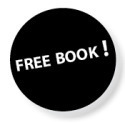 Because direct questions offer endless insight, I'm happy to present Fast Five — short interviews with my favorite writers. Life may be short but who doesn't have time for five questions — and a chance to win a great book? (To win, simply post your name and contact info in the comments section. See details below).
Because direct questions offer endless insight, I'm happy to present Fast Five — short interviews with my favorite writers. Life may be short but who doesn't have time for five questions — and a chance to win a great book? (To win, simply post your name and contact info in the comments section. See details below).
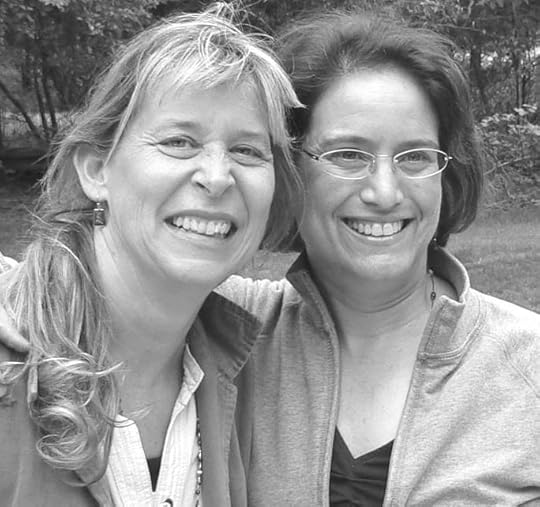 Holly Hughes and Brenda Miller are writers, friends, and authors of The Pen and the Bell: Mindful Writing in a Busy World. Both are accomplished: Holly is a poet, professor, and editor of the award-winning anthology Beyond Forgetting: Poetry and Prose about Alzheimer's Disease; Brenda is editor of the Bellingham Review, and a Pushcart Prize-winning author who teaches at Western Washington University. And both are deeply introspective writers who believe that "writing can be a rich, active form of paying attention to the self and the world."
Holly Hughes and Brenda Miller are writers, friends, and authors of The Pen and the Bell: Mindful Writing in a Busy World. Both are accomplished: Holly is a poet, professor, and editor of the award-winning anthology Beyond Forgetting: Poetry and Prose about Alzheimer's Disease; Brenda is editor of the Bellingham Review, and a Pushcart Prize-winning author who teaches at Western Washington University. And both are deeply introspective writers who believe that "writing can be a rich, active form of paying attention to the self and the world."
I'm intrigued by, and appreciative of, the letter writing practice that led to the creation of The Pen and the Bell. What prompted your correspondence?
Holly: That was one of the wonderful serendipities of this collaboration, as we really just fell into it. We’d drafted an outline with chapters then met to discuss our plan. At the end of our session, we decided it looked too formal for the organic process we’d envisioned, so we decided to continue to correspond by letters (via email) instead. Thankfully, we both had a sabbatical that fall, and so the timing was good. Within a few months, we were both loving the correspondence — I was always delighted to find a “Letter from Brenda” in my In Box — and we quickly recognized that our letters were becoming the book we’d envisioned.
Brenda: Yes, serendipity is the right word, because the idea seemed to just arrive — to materialize as a message to which we both said, “of course.” And once we started writing, it was so much fun that it was actually hard to stop. I think I wrote three letters in the first week!
In the introduction you write that it is important to "carve out space for writing in a world crowded with distraction." In a few words, how does one master this seemingly impossible feat?
Holly: It’s hard to answer this in a few words — we share many specific strategies in The Pen & The Bell — but the premise of the book is that by combining mindfulness practice with writing practice, it’s more possible to carve out space and time; the two practices can work synergistically to support each other. For example, by meditating or reading a favorite poem aloud (contemplative reading) before writing, you can more quickly enter a creative state — where the more authentic writing comes from. Other than that, we give suggestions for taking whatever time you have — at a red light or walking to work—to breathe deeply and re-connect with yourself throughout a busy day — and these small mindfulness practices allow us to bring more of our undistracted selves to the page.
Brenda: It’s really about learning to write more quickly — not spending time “thinking” about writing or agonizing about it, but simply writing, even if you have just a few minutes. We give you lots of prompts — in the book and on The Pen and the Bell website — that can give you places to start. It’s also a matter of prioritization: really getting a sense of why writing is important to you, and forming a community (a community can consist of even just one other person) that helps you value this priority.
What did you gain in the process of writing this book, and what do you hope readers will experience? (I cheated, that's two questions!)
Holly: I’ll address the first question. I think we wrote this book for ourselves — we’re both teaching writing full-time, seeing first-hand all the distractions that we and our students face on a daily basis, distractions that sometimes keep us from writing. As the letters evolved, it became clear that we were letting our creative muse help us find strategies that felt in keeping with both the challenges — and the deeper core values — of our own lives.
Brenda: Yes, and we hope our readers will experience the same thing: some support for their creative lives, an excuse or opportunity to slow down and remember what it feels like to focus in a deeper way than our hectic lives (and minds!) sometimes allow.
I like your idea that "contemplation is an active practice." For you, which came first: writing or mindfulness?
Holly: For me, writing came first, as I’ve been writing in a journal since I was a kid. They both came together twenty years ago when I was working as a mariner on the water in Alaska. Looking back, I view that time — what I called “wheelwatch practice” — as a form of mindfulness practice. I began attending meditation retreats and receiving formal instruction about 12 years ago. I became particularly interested in mindfulness practice after reading several books by the Vietnamese monk Thich Naht Hanh and was lucky enough to attend a week-long retreat at Deer Park Monastery in California when he was in residence.
Brenda: I’ve been writing since I was 7 years old, so I guess writing came first! Though children do seem to be naturals at contemplation as well; they can focus a long time on insects, animals, blades of grass. . . I was always kind of a moody child — quiet, introspective — and so perhaps those two modes have always coincided for me.
I'm a collector of words. What are your favorites?
Holly: What a fun question, Drew! I must admit it’s difficult to choose; there so many words I love, both for their meanings and their sounds, their feel as they roll off your tongue. But here are a few of this week’s favorites: waterfall, bumblebee, pomegranate, bladderwrack, stipple. (The last is from a favorite Hopkins’ poem, Pied Beauty, that has many more great words).
Brenda: delicious, marble, agile, welcome, pineapple (I don’t know if they’re my favorite words, but they popped around in my mind while I pondered your question. Plus, I’ve been on a pineapple-eating kick lately, and the word just makes me feel happy.)
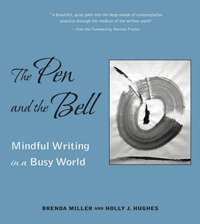 Win this book!
Win this book!
To win The Pen and the Bell, add your name and contact info in the comments section by Sunday, July 1, 2012. Your name will be entered in a drawing, and the winner announced on Monday, July 2, 2012. Feeling shy? Email me, with "Pen and Bell" in subject line: dcm@drewmyron.com



